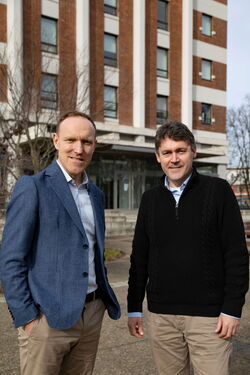Eucor will have a new director

After nine years, Eucor bids farewell to Janosch Nieden and congratulates Bernd Finger on his appointment as the new director
How would you summarise your nine years as Director of the Eucor secretariat and coordination office?
Nieden: It was an incredibly exciting and intense time. Today, we can say without a doubt that Eucor is a very advanced model for a European university and has gained enormous international visibility. We have therefore achieved two important goals from 2015.
What was your personal highlight during your tenure?

Nieden: My personal highlight was the acquisition of EU funding as part of the Horizon 2020 programme for our two doctoral programmes. For the first time, the member universities positioned themselves under the Eucor flag in a highly competitive process and in direct competition with other renowned science centres in Europe. The EGTC was thus successfully utilised as an instrument for scientific networking in the Upper Rhine region.
What personal advice would you like to pass on to your successor?
Nieden: As with almost all European projects, Eucor requires staying power, a great deal of diplomacy, but also the necessary tenacity to achieve the often very ambitious political goals with mostly small means.
Mr Finger, you have been supporting the work of Eucor – The European Campus as Deputy Director since 2020. What are goals do you have for your new role?
Finger: Since the beginning of the year, Eucor has had a new strategy that will apply until 2030. It is an ambitious and inspiring document and I would like to work with the team at the secretariat and coordination office to ensure that we realise our strategic goals as well as possible.
If you had a crystal ball, where would Eucor be in 2030?
Finger: By then, the Eucor universities will have grown even closer together. Joint degree programmes, professorships and perhaps even institutes will be a normal part of the university landscape in the Upper Rhine region.
In 2015, Janosch Nieden joined Eucor, at that time already a long-established association of the five universities, but without a legal form. In December 2015, the Upper Rhine universities founded the first EGTC (European Grouping of Territorial Cooperation) ever, established by higher education institutions. A lot has happened since then. With the help of EU funding, the member universities have developed within 3 years cross-border structures, a joint strategy and governance as well as a funding instrument for innovative project ideas. Today, the European Campus has 15 joint degree programmes, three cross-border professorships with two more planned, as well as two doctoral programmes supported by the EGTC and financed by the EU. The European Campus has become a place of exchange and encounter for around 17,000 researchers, 9,900 doctoral candidates and 120,000 students.